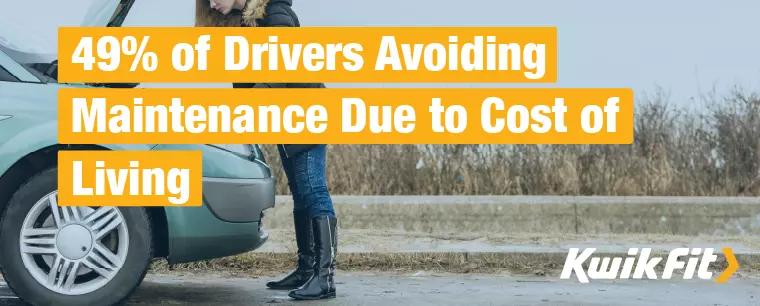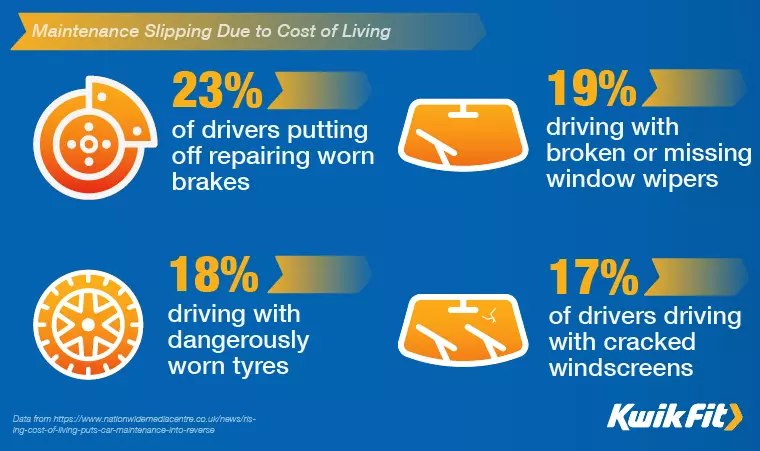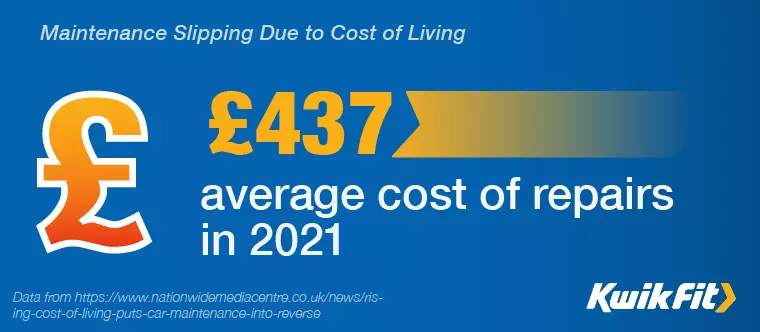49% of Drivers Avoiding Car Maintenance Due to Cost of Living
Jack Dreyer | Tuesday 28th February 2023 12:30pm

Research recently released by Nationwide Building Society reveals that, worryingly, 49% of respondents are putting off vehicle maintenance & repairs due to the ongoing cost of living crisis.
With general living costs soaring, people are looking to save where they can – and it’s no wonder there’s so much anxiety around vehicle maintenance. You can cancel a streaming subscription, but most people rely on their car to get to work, to go shopping, and to get their family around. A broken down car is not something they can work around.
But this is why proper maintenance is crucial.
A whopping 20% of drivers admitted to putting off essential repairs like worn brake pads (23%), broken or missing wipers (19%), dangerously worn tyres (18%), or cracked windscreens (17%).

And, with the average cost of repairs sitting at £437 in 2021 (though 5% had to spend more than £1000 on repairs), drivers are increasingly concerned about affording maintenance.
Avoiding car maintenance is a false economy
A vehicle breakdown is – in almost every case – most likely to happen when maintenance, care, and repairs have been neglected. This is because cars, as heavy objects moving at speed, must constantly hold up in the face of huge forces. A Tiguan’s brakes, for example, have to stop a 1.6 tonne mass from moving – that’s a tall order.
Letting the small components wear, therefore, seems like saving money until that wear compounds into a much more extensive (and therefore expensive) problem.
Take some worn suspension, for example; if the shock absorber gets too worn, then the coil spring alone has to take the brunt of shock forces – quickly leading that to break too.

Car maintenance is about safety
Crucially, the decision to maintain a vehicle seems like an economic one, but it’s actually about safety. It’s easy for it to feel like a personal financial decision to put off replacing, say, brake pads. But brakes failing to stop a car in time don’t only affect the driver of that car, they create potentially fatal hazards for other road users.
Overly worn tyres, for example, can significantly affect stopping distances – quickly escalating a potential hazard from a minor inconvenience to a dangerous situation.
MOTs don’t cover parts worn after the test
It may seem like you can wait for the next MOT before doing repairs, but the driver of the vehicle is still legally responsible for maintaining that vehicle throughout the year. If a police officer were to spot-check a vehicle’s tyre treads and find them below the minimum, the driver can be fined up to £2,500 per tyre and have three points put on their licence – regardless of whether the tyres were suitable at the time of the MOT.
So driving with multiple dangerous tyres can quickly add up to a costly fine, and potentially even losing your licence.
The same is true of many other repairs that drivers are putting off: broken windscreen wipers, cracked windscreens, and worn brakes can all create dangerous situations and leave them legally responsible for collisions. To add salt to the wound, many insurance companies will also refuse to cover the costs of a collision caused by improper maintenance.
Our communication’s director, Roger Griggs, had this to say about the research findings:
“It’s understandable that when times are tough economically, families look to make savings wherever they can. Unfortunately, some car maintenance costs are unavoidable so drivers need to realistically plan their budgets so they can cover them.
“But there are also things drivers can do to make sure their car is running as efficiently as possible – and checks or measures that cost nothing can deliver big savings. Driving more smoothly and braking more gently will reduce both fuel consumption and brake wear, ensuring your pads last longer. Regularly checking that your tyres are at the correct pressure will lengthen their life and also reduce fuel consumption. Cleaning your windscreen and wipers regularly will remove dirt and grime from them and help stop the blades wearing prematurely. And if your windscreen has a small crack or chip, get it repaired before it spreads to the whole windscreen – many insurance policies cover windscreen repair and it’s much cheaper than a full replacement.
“If you do spot a problem with your car, our advice is to not ignore it. In most cases, delaying a repair only leads to it being more costly in the long run, and more dangerous in the meantime. We know times are tough for many, but if there is one place we shouldn’t be taking any risks and cutting corners, it’s on the road.”
Get affordable services at your local Kwik Fit
The good news amidst all this doom and gloom is that you can get world-class services at your local Kwik Fit centre at affordable prices: from brakes to annual MOTs & Servicing, trust our experts to keep your car happy and safe.
What’s more, with our Buy Now Pay Later scheme, you don’t need to break the bank to get your car back on the road.
Any facts, figures and prices shown in our blog articles are correct at time of publication.
Featured Articles
Is it Illegal to Drive With One Headlight?
Saturday 19th July 2025
Wondering if it’s illegal to drive with one headlight? Learn about the safety risks and penalties of illegal blown bulbs and why you should fix them promptly.
Air Con in EVs & Hybrids: Experts Answer Your Questions
Monday 30th June 2025
Does air con drain EV batteries? Can you use the air con while charging an electric car? Find out the answers to these questions & more from Kwik Fit’s experts.
Why Is Your Car Making a Noise? Fixes & Tips
Friday 13th June 2025
When your car starts making unexpected noises, it can certainly be quite disconcerting; it may be nothing to worry about, but here’s what you need to know.









